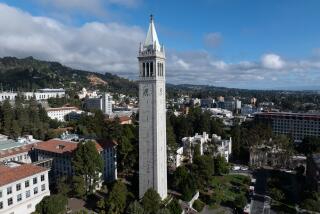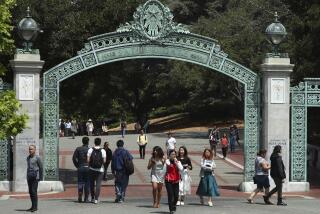CAMPUS CORRESPONDENCE : The Vast Emptiness at the Core of Today’s Liberal Arts Education
BERKELEY — With this year’s graduation season drawing to a close, we won’t have to listen to many more commencement speakers. Usually, they tell the graduating seniors how lucky they were to spend four years acquiring wisdom. As a graduating senior at UC Berkeley, I have a somewhat different perspective--one that wasn’t heard often at this year’s commencement ceremonies but that contains a great deal more truth about the state of American higher education today.
I have done relatively well academically at Berkeley. Even so, I don’t think I’ve received a true liberal education--at least not in the way that a well-educated man of the 19th Century would have understood it. Back then, a university was supposed to provide nourishment for mind, body and soul. American colleges stopped catering to the latter too long ago, when mandatory attendance in chapel and at physical-education classes was abolished. Now, Berkeley and other leading research universities have even stopped feeding students’ minds.
What I’ve missed is an education that integrates philosophy, history, literature and the other humanities into a coherent whole. Part of the fault is my own: I did not seek out some classes that I should have. But a large share of the burden lies with the university, which lacks a core curriculum--for example, “Great Books”--that could provide a general education.
Instead, Berkeley, like many other large universities, offers a host of overly specialized courses that seem to have little connection. The history department offers a class on Theodore Roosevelt; English has a course on science fiction; philosophy offers a class on Hegel. That’s it. Almost no courses attempt to bridge the gulf between these areas. Those that should--that is, introductory courses aimed at freshmen--only offer the same content as the upper-division courses. They have an added drawback: They are taught by inaccessible professors in giant auditoriums before thousands of bored students.
The man responsible for this deplorable state of affairs is Clark Kerr, UC president during the 1960s and one of the most influential figures of post-World War II higher education. Kerr dreamed that the college would become all things to all people--a “multiversity.” Instead, it wound up serving almost everybody inadequately.
Nobody is sure what the university’s mission is anymore: Is it to educate elite students? To create a social melting pot? To conduct graduate-level research? Partisans of all three viewpoints have waged intermittent battles on the Berkeley campus for decades, leaving all the players profoundly dissatisfied.
Undergraduates are therefore denied the opportunity to pursue a comprehensive curriculum. Instead, they are left, like shoppers in a giant supermarket, to wander the aisles, picking products at random, never sure that their selections will add up to a nutritious meal. Laissez faire may work in the economy, but it’s no way to run a university.
This loss of mission has also allowed a weird collection of nuts and cranks to assume prominent positions at Berkeley, as they have at other leading U.S. colleges. Deconstructionists in the English department teach that words have no intrinsic meaning. Revisionists in the history department teach that the Constitution was the result of a capitalist cabal. Newly minted Ph.D.’s in the ethnic-studies field teach that America has waged genocidal war against its racial minorities for centuries. Instructors in the “Peace and Conflict Studies” department teach strategies for nonviolent protest. A sociology professor instructs students on the “plantation system” in professional sports today.
This is education? Thankfully, I’ve been able to avoid most of these professors with an ax to grind. I have managed to study almost exclusively with professors who believe in old-fashioned academic standards and the importance of Western civilization. But most students don’t fare as well. The lucky ones merely miss the chance to be educated. The unlucky ones are indoctrinated by unscrupulous lecturers.
It’s safe to say, then, that the reality of college education today is a far cry from the dreamy land of learning and higher thinking described by commencement speakers. Just ask any recent graduate.






